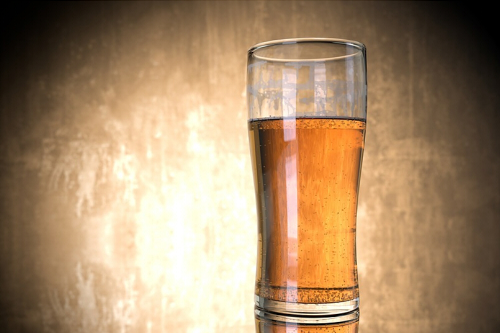Faced with a Ban on Booze, Sri Lankans Have Been Making Moonshine
面对禁酒令,斯里兰卡人开始私自酿酒
The closure of shops selling alcohol was supposed to curb covid-19
关闭酒铺是为了遏制病毒的传播
“Dates, jaggery?” asked the grocer, offering the main ingredients for brewing palm wine. His customer bought both, tucking them away with his onions and lentils before disappearing down a narrow lane in a suburb of Colombo, Sri Lanka’s capital.
杂货店老板拿出了酿造棕榈酒的主要原料,问道:“买椰枣还是棕榈糖?”顾客将这两样各买了一些,并把它们藏在了洋葱和扁豆下面,然后转身消失在斯里兰卡首都科伦坡郊区的一条窄巷中。
On March 21st the government closed all bars and liquor shops as part of a series of restrictions to curb the spread of covid-19. The intention, it said, was to prevent “drink parties” at which the virus might spread and to reduce unnecessary shopping trips.
3月21日,作为遏制新冠肺炎疫情传播的一系列限制措施的一部分,政府关闭了所有的酒吧和酒铺。其目的正是为了防止“酒会”导致病毒传播,同时也减少了人们不必要的购物出行。
Small wonder: when the government first began introducing countrywide measures to slow the spread of the disease, “wine shops” – ubiquitous small stores selling mainly beer and liquor – were mobbed (social distancing be damned) by customers frantically stocking up.
这也在意料之中,当政府为了遏制疫情传播最早在全国范围内采取措施时,各地的“酒铺”(一些随处可见的、主要售卖啤酒和白酒的小商店)就已经挤满了疯狂囤货的顾客(保持社交距离的忠告早已被抛诸脑后)。
Since then, booze has been hard to obtain. Supermarkets offer deliveries, but few have a licence to sell alcohol. For a time, enterprising distributors arranged deliveries of liquor, too, until the authorities made it clear that these were banned.
从那时起,人们就很难买到酒了。超市虽然提供配送服务,但很少有超市具有酒类销售许可证。有段时间,一些胆大的酒水经销商也在提供配送服务,直到后来当局对此明令禁止。
A black market has sprung up, but sellers are hard to find and prices are prohibitive. A bottle of “gal”, which is distilled from coconut-palm sap, goes for almost three times its normal price of about 1,850 rupees ($9.75).
黑市由此应运而生,但卖家难寻,同时价格也高得离谱。一瓶由椰树树汁经蒸馏制成的gal酒的售价几乎是平时价格(约1850卢比,合9.75美元)的三倍。

The obvious, albeit illegal, solution is home-brewing. Sri Lankans desperate for a tipple are mixing everything from beets to pineapple with sugar, water and yeast, and leaving the cocktail to ferment. The result can be cloudy, fizzy and sickly sweet, but is at least mildly alcoholic.
尽管私自酿酒是非法的,但这显然是个办法。犯了酒瘾的斯里兰卡人将甜菜、菠萝等原料与糖、水、酵母混合在一起,使其发酵。最终可能酿成了一种浑浊、起泡、甜得发腻的液体,但它至少带有淡淡的酒味。
The more ambitious are trying to distil these brews into something stronger. One home-distiller describes fending off inquiries from the man who delivers cooking-gas canisters, who wants to know why his consumption has shot up. The next wave of hospital admissions, a common joke runs, won’t be victims of the virus, but of alcohol poisoning.
更有想法的人正试着将其蒸馏成度数更高的酒。一位家庭酿酒师描述了他是如何避开一位送煤气罐师傅的问询的,那人想知道他的用气量为何会猛增。现在流行着一个笑话,下一批住进医院的病人不是因为感染病毒,而是因为酒精中毒。
The police say they have uncovered 18,000 instances of illicit alcohol production. On April 13th, for instance, officials arrested two men making liquor in 36 barrels in a swamp. Home-brewers are harder to catch.
警方表示,他们破获的非法酿酒案件已达1.8万起。比如4月13日,警察就逮捕了两名在沼泽地里酿造了36桶酒的男子。而家庭酿酒师就更难抓获了。
The government, which is losing some 500m Sri Lankan rupees ($2.6m) a day in forgone tax, has asked the telecoms regulator to find some way to stem the sharing of recipes on social media.
政府每天损失约5亿卢比(约合260万美元)的税收,现已经要求电信监管机构想办法阻止人们在社交媒体上分享酿酒的方子。
“They are using Grade Six science knowledge to manufacture alcohol at home,” complains Kapila Kumarasinghe of the excise department. All the same, he admits, “We can’t very well go house to house, raiding kitchens.”
税务部门的卡皮拉·库马拉辛哈抱怨称:“人们正在利用他们6年级水平的科学知识在家中酿酒。”尽管如此,他不得不承认,“我们不可能挨家挨户地搜查人们的厨房”。
英文、中文版本下载:http://www.yingyushijie.com/shop/source/detail/id/2272.html








